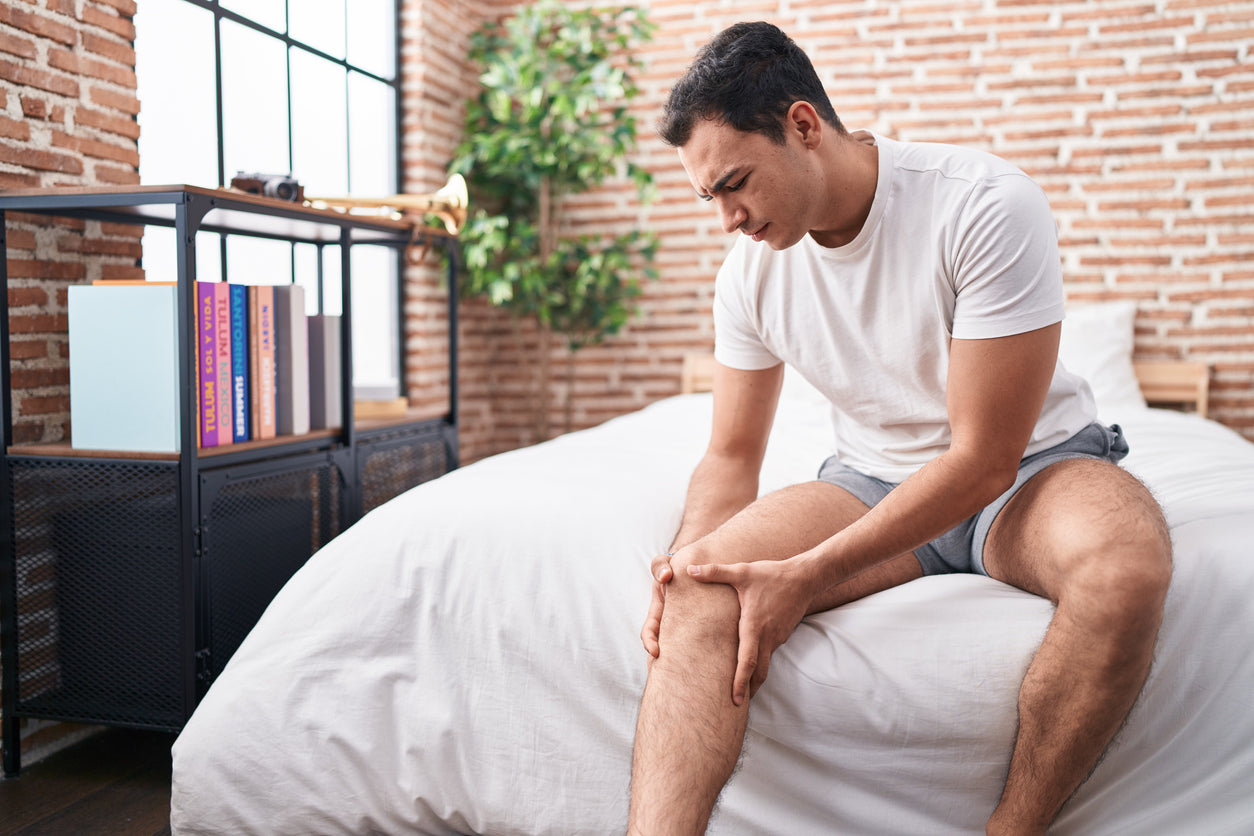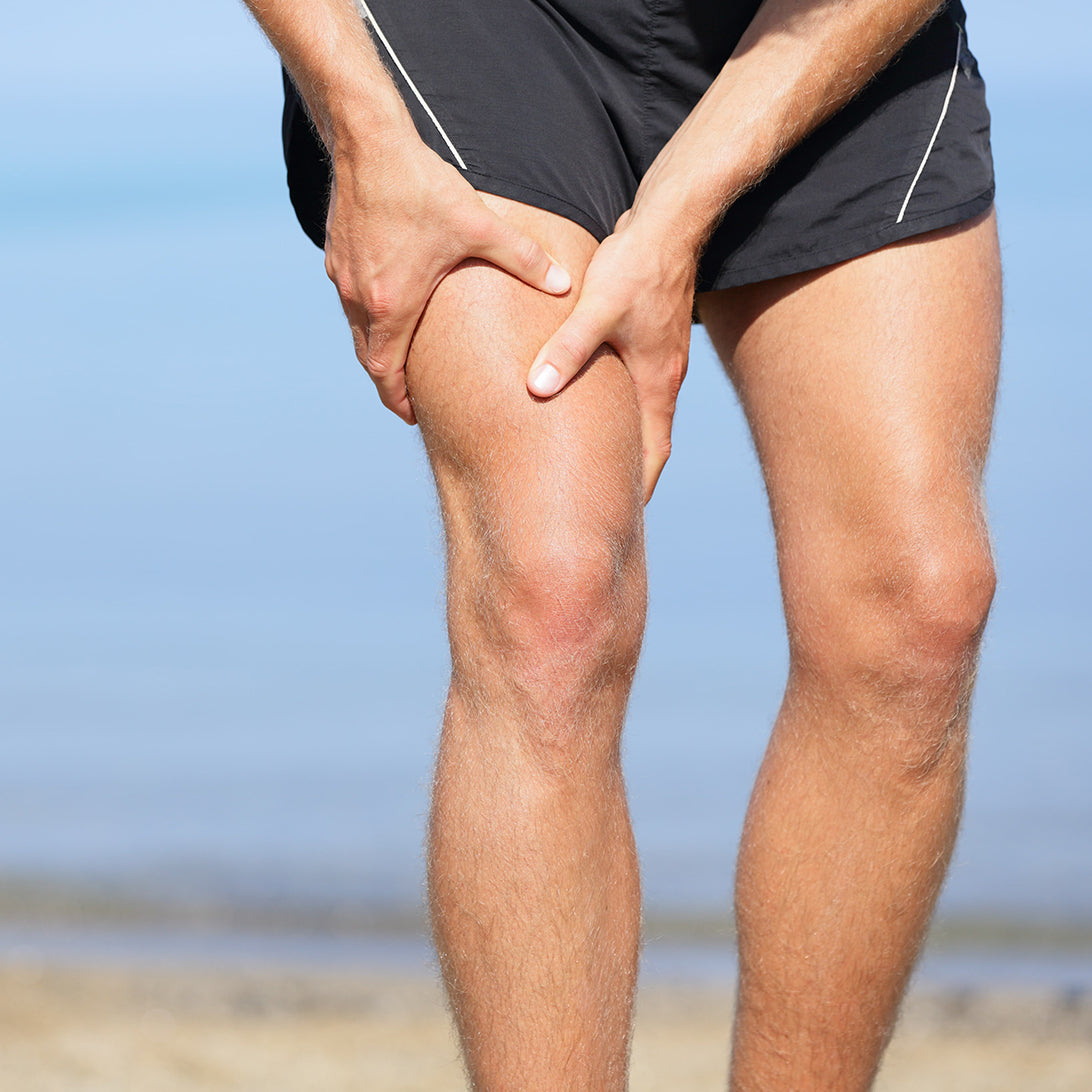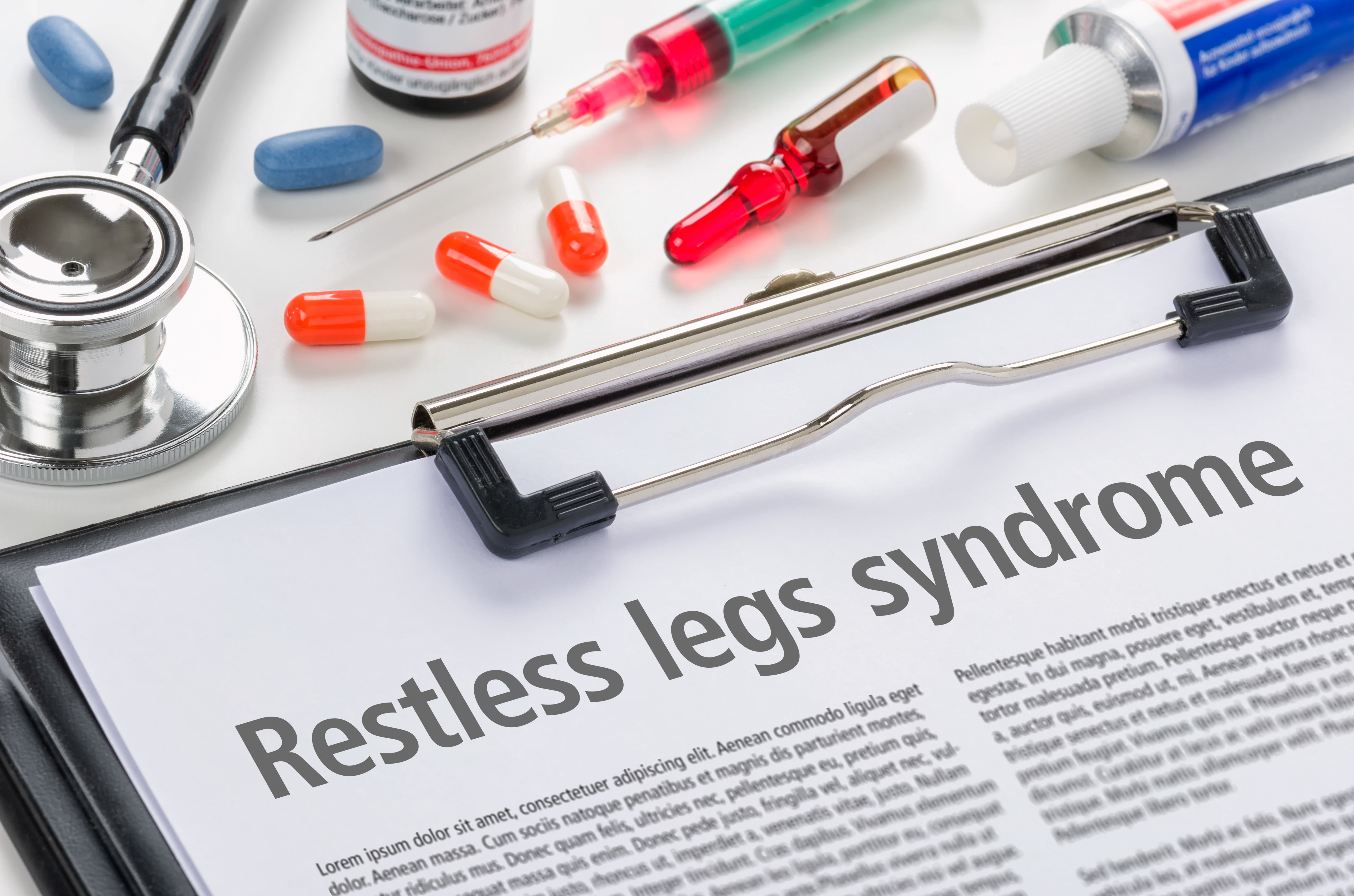Nagging pain in the knee can be a real nuisance, especially when it occurs at night and interrupts your sleep. This type of pain is usually caused by an underlying condition
Have you ever experienced a nagging pain in your knee at night? One that does not go away and comes with a sharp pain that can last for weeks or even months, leading to sleep disruptions.
If yes, then you're not alone!
Millions of people around the world suffer from knee pain, with many of them experiencing this discomfort at night. If you fall within this group, then you may be wondering what you can do to manage the pain.
Fortunately, there are a few steps you can take to help reduce joint pain and discomfort associated with nagging knee pain at night.
In this article, we will go over some of them and provide you with prevention tips to help you feel better. But first, let's go over common causes of chronic knee pain at night.
Possible Causes of Nagging Pain in the Knee
The first step in managing nagging knee pain at night is understanding the underlying cause. Common causes that have been linked to this type of discomfort include:
1. Arthritis
Two common causes of knee pain at night are osteoarthritis and rheumatoid arthritis. These types of arthritis cause inflammation in the joints, leading to constant pain and discomfort.
Osteoarthritis occurs when the cartilage between the bones of the knee joint wears away, while rheumatoid arthritis is an autoimmune condition that causes inflammation in the joints.
What leads to this form of arthritis remains unknown, but it is believed to be linked to age and genetics. If you have an arthritic knee condition, you must consult your doctor for a proper diagnosis and treatment plan.
2. Injury
Injuries such as sprains, strains, and fractures can also lead to nagging knee pain at night.
Sprains occur when cruciate ligaments that connect the knee joint are stretched or torn, while strains occur when muscles and tendons around the knee joint are overstretched or torn. In contrast, fractures occur when one of the bones in the knee break.
These injuries can cause inflammation and pain in the knee joint, which can worsen at night.
3. Repeated stress due to overuse
Overuse is another common cause of nagging knee pain at night.
This occurs when the muscles and tendons around the knee joint are overworked or strained due to daily activities such as running, jumping, or climbing stairs.
When muscles and tendons in the lower limb become stressed, they can become inflamed and cause pain in the knee joint. Overuse injuries can worsen at night, leading to nagging pain.
4. Aging
As we age, our bodies become less able to repair and regenerate tissue, which can lead to nagging knee pain at night.
This is because the cartilage between the knee joint bones begins to wear away, leading to inflammation and discomfort.
People above the age of 40 are more likely to have painful joints. If you fall into this age group, you must speak with your doctor for a proper diagnosis and treatment plan.
This way, you can get the help you need to manage your pain.
5. Tendonitis
Tendonitis is another common cause of nagging knee pain at night.
This occurs when the tendons around the knee joint become inflamed due to overuse or injury. Symptoms of tendonitis include pain, swelling, and stiffness in the affected area.
When left untreated, tendonitis can worsen and cause more severe pain. That's why it's essential to speak with your healthcare provider if you suspect tendonitis may be the cause of your nagging knee pain.
Now that you know some common causes of nagging knee pain at night. Let's look at some treatment options you can use to manage it.
Treating Nagging Pain in the Knee at Night
Managing nagging knee pain at night can be done through a combination of treatment options.
These options may involve lifestyle changes such as avoiding activities that strain the knee joint or taking medications to reduce inflammation. Let's look at some of them in more detail.
1. Try physical therapy
Physical therapy is an effective treatment option for nagging knee pain at night.
It involves exercises and stretches that can help strengthen the muscles and tendons around the knee joint. This can help reduce inflammation and pain in the affected area.
A physical therapist can guide you through the right exercises and stretches for your condition. They may also recommend low-impact exercises to improve the affected area's flexibility and range of motion. Additionally, a physical therapist can provide guidance on proper posture and body mechanics to help prevent further injury or strain.
If you have nagging knee pain at night, speak with your doctor or physical therapist about the best treatment options for you.
2. Take over-the-counter medications
Taking over-the-counter pain medications such as ibuprofen or Acetaminophen can also help reduce inflammation and pain in the knee joint.
Ibuprofen is a non-steroidal anti-inflammatory drug (NSAID) that works by blocking the production of certain chemicals that cause inflammation, while Acetaminophen is a pain reliever that works by blocking the body's pain signals.
If these over-the-counter medications are not highly effective for your pain, your doctor may prescribe more potent drugs such as opioids or corticosteroid injections.
Corticosteroid injections are powerful anti-inflammatory medication that works by reducing inflammation, while opioids are strong pain relievers that work by blocking the body's pain signals.
It is important to note that these medications should only be used as a last resort and taken as prescribed by a medical professional.
3. Use a heat or cold compress
Heat and cold therapy are two common treatments for knee pain in the leg.
Heat therapy helps to increase blood flow to the affected area, which can help reduce inflammation and pain. Cold therapy helps to reduce swelling and numb the area, providing temporary relief from pain.
When using heat or cold treatments, it is essential to use caution and follow instructions carefully. Heat should be applied for no more than 20 minutes at a time, and cold should be applied for no more than 10 minutes.
Ice packs and heat therapy are effective treatments for knee pain, but it is essential to speak with your health care provider before using either.
4. Massage your knee
Massage therapy is an effective treatment for knee pain. Massage can help to reduce inflammation, improve circulation, and relax the muscles around the knee joint. It can also help to reduce tension in the body and promote relaxation.
When receiving a massage, it is essential to communicate with your therapist about any areas of discomfort or pain. The therapist should be able to adjust their technique accordingly to ensure that the massage is both comfortable and effective.
While treating nagging knee pain is crucial to staying healthy, it is also essential to take steps to prevent further injury or strain. Let's look at some tips for preventing nagging pain in the knee at night.
Prevention Tips for Nagging Pain in the Knee at Night
Preventing nagging pain in the knee at night can be a challenge, but there are some steps you can take to reduce your risk. Some of them include:
1. Rest and avoid activities that cause pain
The first step to preventing nagging knee pain at night is avoiding activities that strain your knee joint. This includes activities such as running, jumping, and squatting.
High-impact activities can cause further damage and increase the risk of injury. Instead, opt for low-impact activities such as walking, swimming, or cycling. These activities are gentler on the joints and can help strengthen your knee joint muscles.
2. Wear supportive shoes
Wearing supportive shoes can help reduce knee joint strain and provide extra cushioning to prevent injury. Look for shoes that have good arch support and cushioning in the sole. You can also consider using orthotics to provide additional support and stability.
Orthotics are custom-made shoe inserts that can help reduce knee joint strain and improve your posture. Just ensure that you get the right size and type of orthotics for your feet.
3. Strengthen your knee muscles
Strengthening your knee muscles is another effective way to prevent nagging knee pain at night. Low-impact exercises such as squats, lunges, and leg lifts can help strengthen your knee joint muscles and reduce strain on the joint.
It is essential to start slowly and gradually increase the intensity of your exercises. You should also take breaks between sets to allow your muscles to rest and recover.
4. Maintain a healthy weight
Maintaining a healthy weight is essential in preventing nagging knee pain at night.
Excess body weight puts extra strain on the knee joint and can lead to inflammation and pain. Losing even a small amount of weight can help to reduce the pressure on the knee joint and reduce your risk of injury.
To maintain a healthy weight, focus on eating a balanced diet and exercising regularly. Foods rich in omega-3 fatty acids, such as salmon and walnuts, can also help reduce inflammation in the knee joint. However, it is important to speak to your doctor before making any major dietary changes.
5. Stretch regularly
Stretching is an important part of any exercise routine and can help to reduce the risk of nagging knee pain at night.
It helps to improve flexibility and range of motion in the knee joint, which can help to reduce strain on the joint. It is important to stretch both before and after exercising to ensure that your muscles are properly warmed up and cooled down.
With these prevention tips, you can reduce the risk of nagging knee pain at night and keep your joints healthy. Remember to communicate with your doctor or physical therapist if you experience any persistent pain or discomfort in your knee.
You can also consider using fitness devices to feel better for extra support and stability. Let's look at popular fitness devices that can help you with your knee pain.

Fitness Tools to Relieve Nagging Pain in the Knee at Night
Combining fitness tools with your treatment plan is also a great way to reduce nagging knee pain at night. Here are just a few of the most popular fitness tools that can help:
1. Wear a knee brace for extra support
Knee braces are a great way to provide extra support and stability to the knee joint, helping to reduce pain and inflammation.
They come in various sizes and styles, so it is essential to find one that fits properly and provides the proper support for your needs. Wearing a knee brace can also help prevent further injury or strain by providing additional stability while you move.
They are easy to use and can be worn during the day or at night.
2. Use a foam roller to massage your knee
Foam rollers are an effective way to massage the knee joint and reduce pain.
They help to improve circulation, reduce inflammation, and increase flexibility in the joint. Using a foam roller is easy and can be done at home or in the gym.
Start by rolling the foam roller up and down your knee joint, focusing on any areas of tightness or pain.
3. Use Air C Pro to reduce pain
Air C Pro is a revolutionary device that uses air compression technology to help reduce nagging knee pain at night.
It works by providing targeted pressure to the knee joint, helping to reduce inflammation and improve circulation. It also helps to improve flexibility and range of motion in the joint, which can help reduce pain and discomfort.
Air C Pro is easy to use and can be used while lying down or sitting up.
4. Use a massage gun to ease tension
Massage guns are a great way to relieve nagging knee pain at night.
They use vibration and percussion to help release tension in the muscles and improve flexibility, which can help reduce inflammation and pain.
They are easy to use and can be used on various parts of the body, including around the knee joint.
When using a massage gun, starting with a low-intensity setting is essential and gradually increasing the intensity as needed. Using the massage gun correctly is also crucial, as incorrect use can cause further injury or strain.
Start by placing the massage gun on the muscles around your knee joint and slowly move it around in a circular motion for a few minutes.

5. Use compression sleeves for stability
Compression sleeves are also another way to reduce nagging knee pain at night.
They are designed to provide extra support and stability to the knee joint, helping to reduce pain and inflammation. They are lightweight and easy to use, making them an excellent choice for those who suffer from nagging knee pain at night.
Compression sleeves are also known to help improve blood circulation, which can help speed up recovery time.
By combining these fitness tools with your treatment plan, you can find relief from nagging knee pain at night. It is essential to speak with your doctor before starting any new exercise or fitness routine to ensure that it is safe and effective for your needs.
Frequently Asked Questions
Let's look at some of the most commonly asked questions about nagging knee pain at night.
Why does my knee hurt at night?
Knee pain is often worse at night because the body is more relaxed, which can cause the muscles and crucial ligaments around the knee joint to become tighter. This can lead to increased inflammation and pain in the area.
Additionally, gravity can pull on the knee joint when lying down, leading to further discomfort. Other factors, such as age, weight, and physical activity level, can contribute to knee pain at night.
When do I need to seek medical attention for my knee pain?
When it comes to nagging knee pain at night, it is essential to seek a medical professional if the pain persists or worsens.
Your doctor can help diagnose the cause of your knee pain and provide treatment options to help reduce your common symptoms. Surgery may be recommended in very severe cases.
That's why it is essential to speak with your doctor if you are experiencing persistent or worsening knee pain at night. Your medical history and current health should also be taken into consideration before taking any medications.
What risks are associated with nagging knee pain?
Several risks are associated with chronic knee pain at night, including increased inflammation and swelling, decreased mobility, and an increased risk of injury.
Additionally, this medical condition can worsen over time and lead to more severe complications if left untreated. That's why it is essential to go for a physical exam and speak with your doctor if you are experiencing nagging pain in the knee at night.
Will my knee pain go away on its own?
It is possible that your knee pain may go away on its own, but it is essential to take the necessary steps to reduce your symptoms and prevent further damage.
Taking measures such as wearing a knee wrap for support, using a fitness tracker to monitor activity levels, and seeking medical attention if the pain persists or worsens can help reduce it.
Conclusion
Experiencing nagging knee pain at night can be a frustrating and uncomfortable experience
Fortunately, several treatments and strategies can help reduce the discomfort associated with this painful condition.
Compression sleeves, knee wraps, and fitness trackers are helpful devices to provide extra support and stability to the knee joint. Additionally, it is essential to seek medical attention if your symptoms persist or worsen.
We hope this article has provided helpful information about nagging knee pain at night and how to manage it. Let us know in the comments if you have any questions or tips to share.




